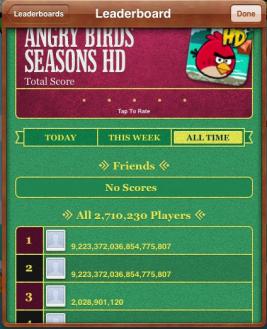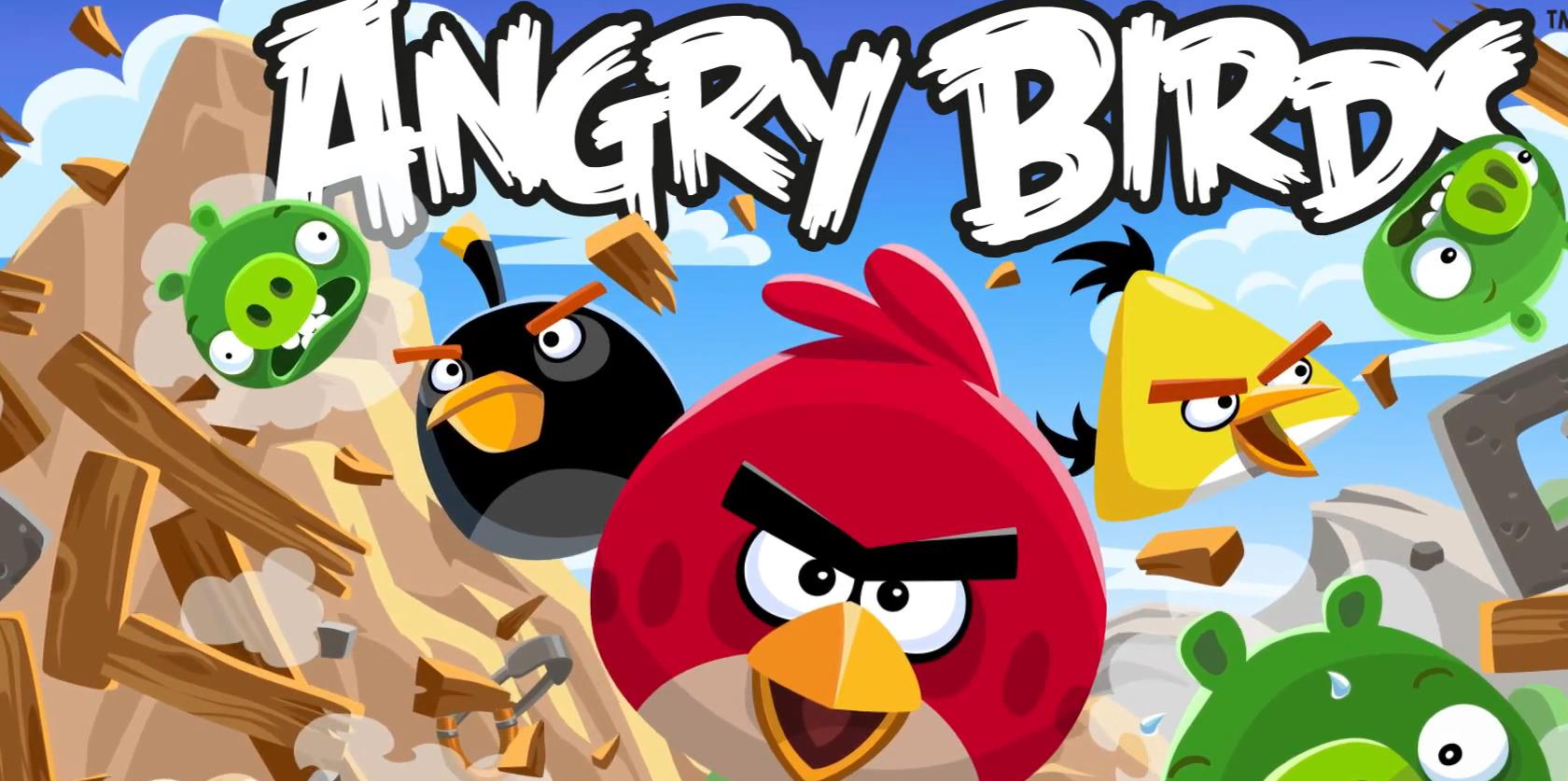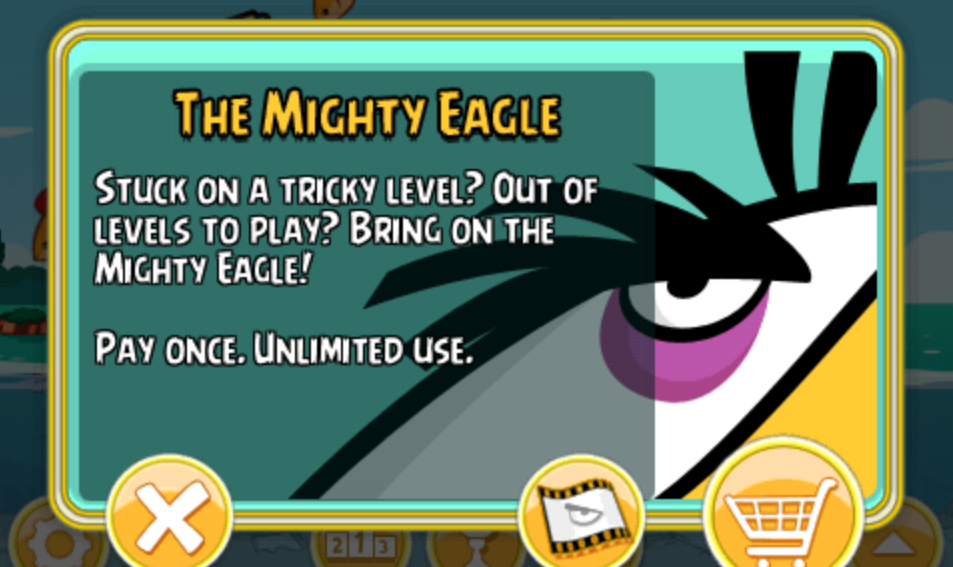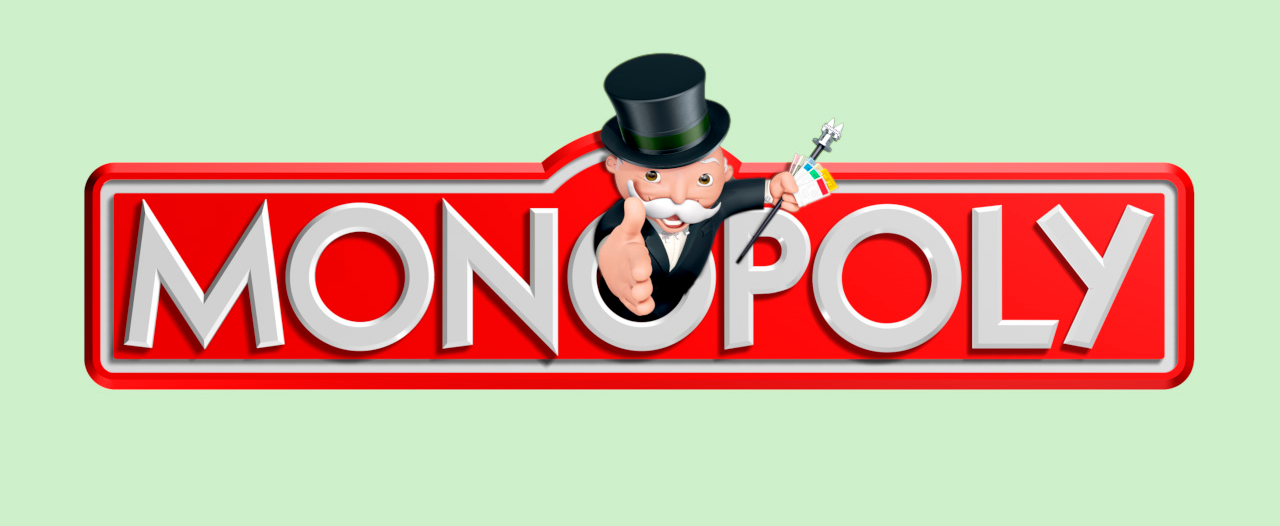Rovio, the makers of Angry Birds, recently announced layoffs, as reported in Wired and elsewhere. I don’t believe, however, that Rovio’s issues stem from the inherent nature of mobile gaming.
If we look at their iconic games, we find “innovations” that distract from game play and push advertising and upgrades at every turn. Angry Birds started as an engaging game playing experience that was simple and well designed. Rovio has lost its strategic path as the company attempted to enhance revenue streams through push sales automation and near coercion of their audience.
Advertising: Push vs. Pull. I don’t play games on my tablet. Well, not very much. But Angry Birds got to me. It was simple, but challenging. Each scene represented a tiny puzzle that must be solved to reach a high score. Those not motivated by competition could just enjoy flinging birds and popping pigs. The free versions offered a good introduction to the game with minimalist banner ads to support the freeness of it all. Most people could play for hours and just enjoy.
But somewhere that all changed. Angry Birds, be it the free version or the one paid for, became advertising platforms. Ads for Rovio properties interrupted game play and ruined people’s game-play timing. Now I’m sure the various advertising platforms that hooked Rovio offered executives enhanced revenue if they were to integrate these models into their games, but what they didn’t do, and couldn’t, was offer better game play. Rovio knew how to do that, but money got in the way of their better design judgement.
But this is a bigger issue than technology or design. Rovio, in a world overwhelmed by information, Rovio went retro. The company started pushing messages at a world that has become more pull than push. Perhaps the best model for them to draw from is Disney. When people unload from Disneyland’s It’s a Small World, they exit through a gift shop. This technique has even become a cliche, but the gift shop, for all of its clear “buy something” design, remains just an opportunity. No Small-World-clad sales people descend upon ride goers and ask them to stop and buy on their way out. Opportunities for people to buy are many, but it is a pull model at work. The ride intrigued, and after it is over, guests have the option of buying something to remember it by.
The Disney experience is very different from the Rovio gaming experience. Rovio owns some great characters. Simple, well drawn and fun, just like Mickey and the gang. But Rovio is exploiting its birds, pushing them in your face and transforming them from cute to annoying, not because of their own inherent character, but because of the marketing character of their maker. Rovio needs to back off of its in-your-face marking or risk further decline. Poor managers will opt for more marketing, more push, because more will make more people aware. But that is yesteryear marketing. that will only make more people annoyed and more game players numb. Rovio needs to trust that its brands and experiences will get people to remain and engaged, upgrade and buy more. Give them something great and they will want more. Tell them they need something to transform a mediocre experience and customers will doubt the authenticity and sincerity of that message.
Scores in the Apple Game Center
Back in June of 2012, I reported that Apple’s Game Center had been hacked, and nobody was doing anything about it. 9,223,372,036,854,775,807 is not a legitimate score. Many players report online that they have quit games because of this hack. All the Angry Birds properties have been hacked on Game Center. Personally, still own high scores, but I don’t appear on the leader boards. No t even close. At one point I was #164 out of #3,255,881 on paid version of iPad Angry Birds Seasons. With the hack, the leader board has no relevancy except to take away from the overall experience. If Rovio wants competitive people to care about their games, they need to worry the details a little more.
t even close. At one point I was #164 out of #3,255,881 on paid version of iPad Angry Birds Seasons. With the hack, the leader board has no relevancy except to take away from the overall experience. If Rovio wants competitive people to care about their games, they need to worry the details a little more.
Free apps have become unplayable.
The free apps used to be the entry point to an addiction. Today, they have been re-crafted into advertising engines and real teases rather than fun teases. The apps have become almost unplayable, and therefore very poor introductions to the Rovio worlds (though, good representatives of the current state of the games and therefore, honest, if not good, marketing tools). The free apps need to be simplified again, as do their for-pay counterparts.
PowerUps and other distractions and interruptions. It isn’t just the advertising that has distracted from game play, but increasingly complicated poor designs hinder the game experience right from the start. Angry Birds Star Wars II begins with awards and claims, that interestingly (or not so) you can dismiss, but that isn’t clear from the user interface. Just tap outside of the offer and you get to the opening screen, but before that, you think you have to do something, and even worse, two shopping carts loom on the page, which means it will probably cost me money if I click. Rather than figure it out, people just leave the game.
Angry Birds Star Wars II is also a good example of the excessive “monetization” that makes the game less fun, not more so. Sure, it makes the game more personal because people can sort of design their own experiences, but those players are no longer playing real head-to-head competition with other players, or even themselves. Each time they enter a scene they can decide which birds attack, making game play unique, but also feeling a bit unwieldy and kind of cheaty.
And to take distraction to the next level: many mothers and fathers loaded up Angry Birds and handed their phones to children as a distraction. This complicated game environment now eliminates Angry Birds from being the only kind of thing for which the word distraction could be said to be remotely positive.
The Angry Birds Account. The Angry Birds account tracks game play across systems. It isn’t implemented universally across the properties, which means, that if you earn rewards in Angry Birds Star Wars II those rewards can’t be redeemed in another game. If I’m logging into a ecosystem, then that ecosystem needs to be consistently implemented and cross-pollinating across properties. If it isn’t, it becomes superfluous to the experience, and yet another distraction.
The Business Model. When I buy a game I expect it to be complete unless I have been warned ahead of time that the came includes “in-app” purchases. I don’t believe when I first purchased Angry Birds Space, for instance, that it had in-app purchases. It has them now. And I know Angry Birds didn’t have it until the introduction of the Eagle. Now of course, all of the games of are filled with in-app purchases and the pushy interfaces to get you to buy them. This is a bait and switch. If you buy an app that doesn’t have in-app purchases, it should remain in-app purchase free forever.
I have no issue with a new game that changes the business model, but don’t sell something that makes a brand promise one day, even an implied one, and then breaks it in the future.
How to Make a Game Franchise: Lessons from Monopoly
Hasbro makes and sell Monopoly. Everybody who has played the game understands it, and even in derivative forms, its basically the same game, even if the names of currency and properties change along with the shapes of player tokens. Hasbro/Parker Bros has provided a great blueprint for the long tail. A game invented in 1933 continues to sell, in many forms, with all of those forms offering a consistency of experience and a singular promise that if you end up with the most money and property at the end, you will win.
Many derivatives exist in the Hasbro arsenal, but they haven’t changed the primary game in anyway that mucks up the gamer experience. Even the basic computer games do little more than automate dice rolling and digitized token movement. Rovio needs to study companies and games that have lived the long haul and get out of the offices of people who say things like “monetize” and “minimum viable product.”
A final sling and arrow
I have justified my own addiction to Angry Birds by deriving management rules. I have given talks on what CIOs can learn from playing Angry Birds, as well as what knowledge mangers can learn. This work informs me that Rovio has more than they think in their collection of characters and scenery, most likely unintentionally. But art, and game making is an art, and as such, often reflects the values and struggles, insights and experiences of its creators. Rovio, rather than capitalizing on its positive brand attributes, has become just another company trying to capitalize on its brand. That is a formula for short run success, but not one that will take Rovio into the realm of a Disney or a Warner Bros.
Strategically, Rovio needs to back away from pushing its revenue ambitions on its customers and return to the intriguing worlds, and simple gameplay that made them a phenomenon in the first place. Executives too often listen to investors that want more money – investors who often prove overly zealous about sharing their insights about what makes for a good game experience with positive revenue. And sometimes company executives have their own unfulfilled visions that early bootstrapping couldn’t afford, so they, like George Lucas constantly tweaking Star Wars to its determent, add features that fans didn’t ask for. Now of course, any visionary will tell you that when it comes to innovation, consumers don’t know want until they see it, and that is true enough. But conosumers also vote quickly on “innovations” that don’t add value, and that is what Rovio is suffering from now, I think, more so than people’s general weariness with Angry Birds.
At Disney, political battles are often de-escalated when people are reminded they are arguing about mice and ducks. Rovio needs to realize that their core strategic asset is a flock of angry birds that found their way into consumer’s hearts. Rovio will have a bright future if it decides to pop its own non-competitive pigs and rekindle the simple anger that made its earliest efforts so great.




